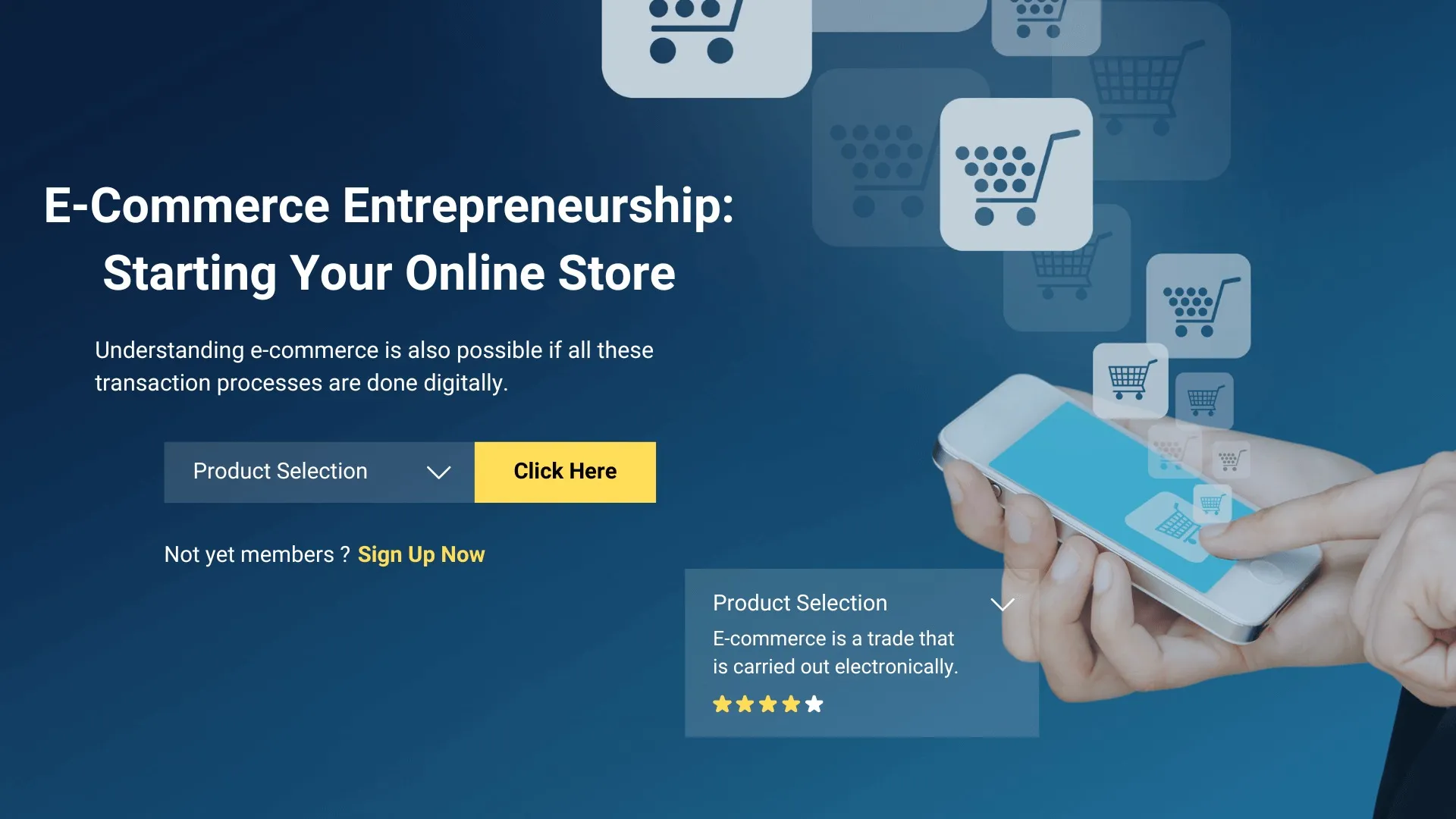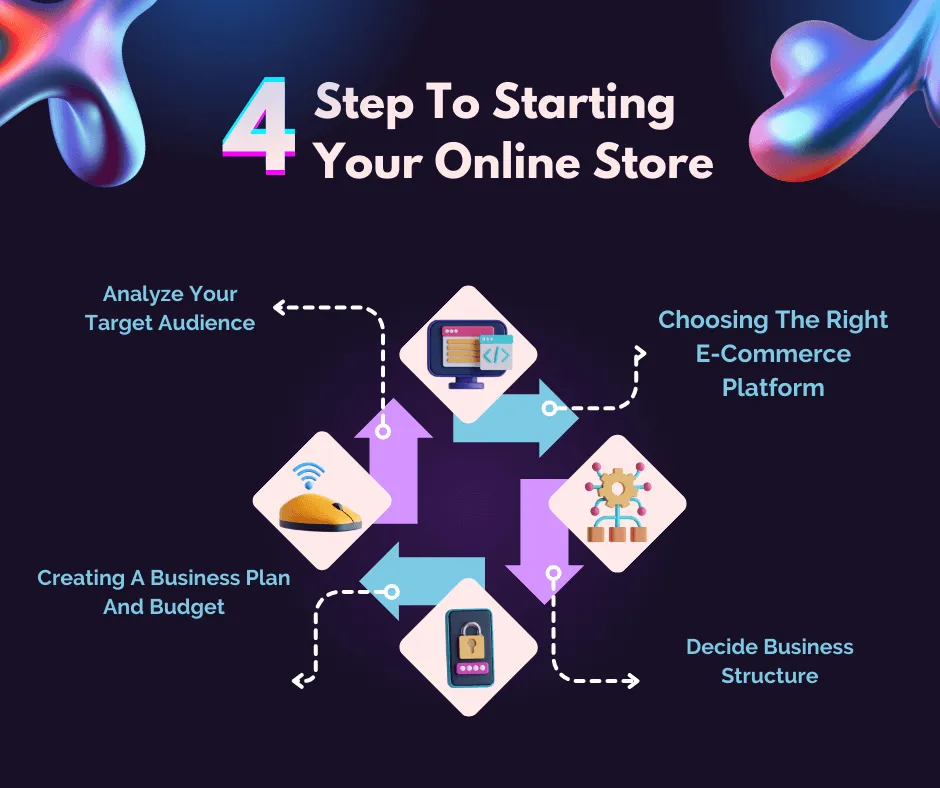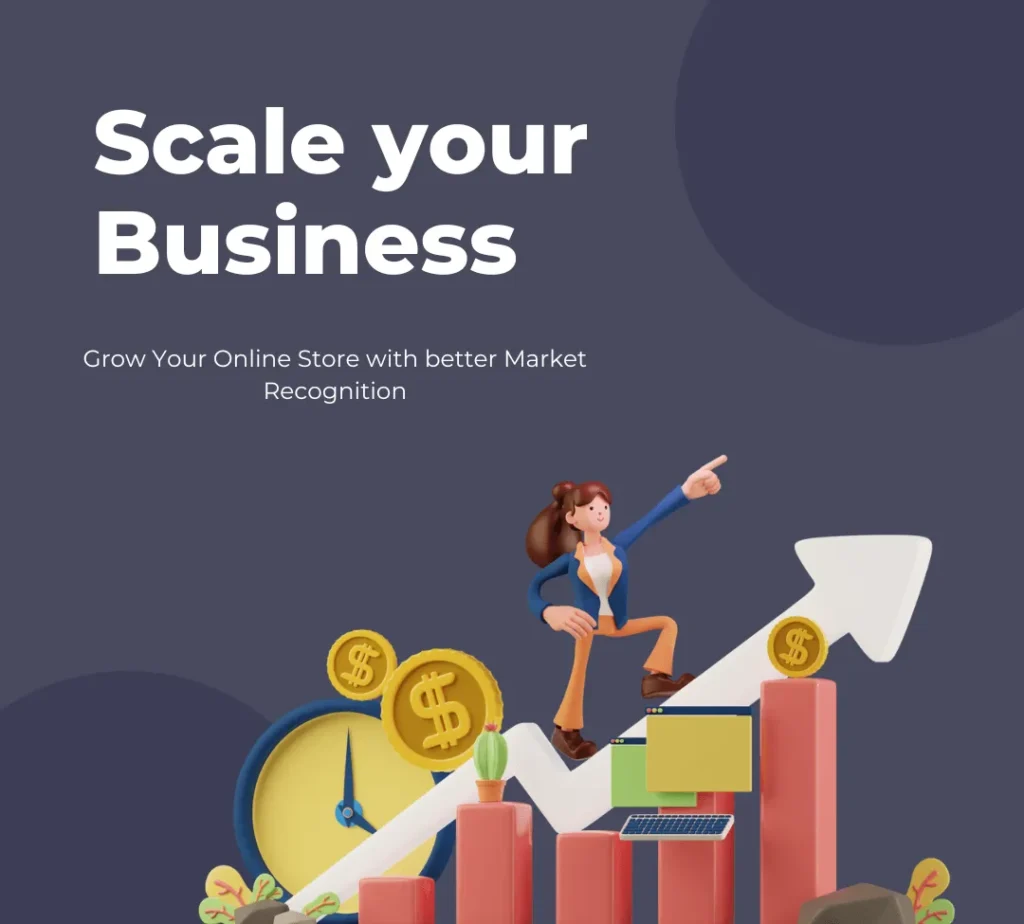
E-Commerce Entrepreneurship: Starting Your Online Store
Mastering E-Commerce Entrepreneurship for Your Dream Store"
Business Ideas
Introduction
E-commerce entrepreneurship is a cutting-edge business model enabling anyone to launch and manage their online stores and access the sizable digital market. Online shopping has become the rule in our fast-paced world, so it is important to have an online store. Entrepreneurs can use this platform to promote their goods around the world, connect with clients from all over the world, and use new technologies to make transactions easier. This introduction goes over the basics of this cutting-edge business model, with a focus on how it can change the way the economy works right now.
Understanding E-Commerce Entrepreneurship:
In the digital age, entrepreneurship is the establishment, maintenance, and expansion of an e-commerce website-based enterprise. Using an online marketplace, entrepreneurs can sell a variety of goods and services. E-commerce is a contemporary business framework that relies on the internet to conduct business. This description offers a deeper understanding of e-commerce entrepreneurship.
Online marketplace have been the subject of extensive research to monitor their development and analyze trends. In these studies, analysts evaluate the expansions of e-commerce companies, the impact of technology on consumer behavior, and the manner in which business entrepreneurs continuously adapt their models to the current market dynamics. Understanding the evolution and behaviors of digital commerce provides valuable insight into the E-Commerce Entrepreneurship environment, illuminating opportunities for innovation and success.
Critical Steps to Starting Your Online Store:
Launching an online store through an e-commerce project involves a deliberate series of steps. This section outlines the essential stages needed to create a prosperous online business.
I. Niche Selection and Market Research:
To establish a thriving online store, one must first thing is a niche or specific audience with untapped potential. Thoroughly researching the market becomes crucial in unraveling client preferences, understanding competitors, and staying abreast of industry trends.
II. Choosing the Right E-Commerce Platform:
Choosing the appropriate e-commerce platform is significant. Look at options that fit your business goals and provide user-friendly interfaces, customized features, and safe payment ways.
Ecommerce is one of the most significant phase of the retailing business. In this online business you don’t need a specific budget. It’s mean you can start it from a moderate budget and exceed it to higher scale when it start growing successfully.

III. Creating a Business Plan and Budget:
A strong business strategy outlining your goals, target audience, expected revenue, and marketing strategies is essential. Make a reasonable budget that accounts for startup, ongoing, and marketing costs.
IV. Designing and Setting Up Your Online Store:
Create an online store that reflects the aesthetic of your business, is user-friendly, and is aesthetically pleasing. Ensure that the website is user-friendly and the product categories are clear. Establish rules, payment methods, and delivery alternatives to improve the purchasing experience. By adhering to these essential methods, prospective E-Commerce business proprietors will be able to create an online store that effectively communicates with their target market and establishes the foundation for a prosperous enterprise.
Product Selection and Sourcing
In the world of e-commerce entrepreneurship, the success of your online business is directly influenced by the products you sell. This segment discusses in detail the procedures of product sourcing and selection, which are essential to the success of an e-commerce business.

I. Identifying Winning Products:
Conduct extensive market research in the region of your choosing to identify products that meet current trends and consumer demands. Think beyond limitations and seek out unique items to distinguish your online store. Ensure that these products satisfy the specific needs and preferences of your target market. You can gain a market advantage over your competitors by providing distinctive and popular products.
II. Sourcing Suppliers:
In order to be successful in e-commerce, you must build strong relationships with dependable suppliers. Prioritize manufacturers, wholesalers, and dropshipping partners who can ensure consistent quality, quick deliveries, and reasonable prices. A trustworthy supplier network will guarantee a steady supply of products, thereby enhancing the credibility of your online store.
III. Quality Assurance:
In e-commerce, maintaining a quality reputation is crucial. It facilitates the delivery of products that consistently transcend customers’ expectations. Incorporate stringent testing and item inspection procedures into your quality control procedures. Maintaining a high product quality standard can ultimately increase consumer satisfaction, confidence, and loyalty.
IV. Inventory Management:
An effective inventory management system is the foundation of a prosperous e-commerce company. Utilize innovative inventory management systems to monitor stock levels. This strategy assists in avoiding inventory shortages, which irritate consumers, and overstocking, which drains cash. Finding the optimal inventory level helps to ensure efficient operations and meets customer expectations successfully.
V. Pricing Strategies:
To determine the appropriate pricing, thorough consideration is necessary. Consider a number of factors, such as production expenses, current market pricing, and desired profit margins. Provide advertising campaigns, seasonal sales, and promotional activities with flexibility. This adaptability positions your store to be competitive and profitable, while also attracting customers.
VI. Product Descriptions and Imagery:
Writing engaging product descriptions is the secret to attracting consumers. Write captivating and instructive descriptions of the attributes, advantages, and solutions of your products. Utilize high-quality images and videos that provide a detailed summary of your products to increase consumer engagement. Graphics that are distinct and vivid increase client retention, confidence, and sales.
Creating a Strong Online Presence
For e-commerce success, a well-established online presence is required. This section focuses on essential components, such as branding, website optimization, and content creation. Make your brand stand out, simplify your website’s navigation, and write intriguing product descriptions. Customers’ user experience is further improved by high-quality visuals and mobile optimization. While SEO strategies enhance search engine visibility, social media integration fosters community engagement. These techniques assist you in establishing a solid online presence that inspires client trust and bolsters the credibility of your online business.
Launching and Marketing Your Online Shop
The beginning and promotion of your online store is the final stage in establishing a successful e-commerce business. This section outlines to users the steps necessary for a successful launch. It describes the creation of a launch strategy, which includes silent launches and interest-building marketing prior to the debut. Several marketing techniques, including influencer relationships, email advertising, and social media, increase visibility. Adopting digital advertising, such as pay-per-click ads, increases exposure. Utilizing blogs and videos in content marketing encourages audience participation. Customer testimonials and referrals can be used to build trust. Your online store’s visibility and growth trajectory are accelerated by a well-planned launch.
Managing Operations and Customer Experience
A profitable online store is founded on efficient operations and superior customer service. This section discusses inventory management, order processing, and delivery logistics. It emphasizes the significance of secure transactions and frictionless payment methods for fostering consumer confidence. Implementing a responsive customer service system increases customer loyalty and satisfaction. Utilizing data analytics to monitor sales, consumer behavior, and website performance facilitates strategic decision-making. The processing speed of returns and refunds influences consumer satisfaction. Prioritizing client feedback for continual development is the first step in building lasting relationships. In a well-run business, customer satisfaction is a given, which helps your online store grow.
Scaling Your E-Commerce Business
The strategies listed below will help you negotiate the challenges of scaling your e-commerce firm and ensure long-term success:
I. Analyzing Data and Performance Metrics:
As your online store grows, data analysis and performance statistics become increasingly important. Monitoring essential data such as website traffic, conversion rates, client retention, and sales trends is part of this process. You can optimize your business plan and improve performance by identifying what is and is not working.
II. Expanding Product Range and Market Reach:
Scaling involves expanding your product portfolio and market share. Recently introduced products or product categories may pique the interest of a larger consumer base. Discovering new demographics or geographic regions can also help you reach a larger audience and identify untapped development potential.

III. Exploring Growth Strategies and Partnerships:
Consider implementing diverse strategies and alliances, including affiliate relationships, influencer partnerships, and associations (primary affiliations). Influencers can recommend your products to their audiences, while affiliates can promote your business for a commission. Strategic alliances with competitors or retailers can increase your visibility and benefit both parties.
Conclusion
E-commerce entrepreneurship provides access to a variety of contemporary business options. As we contemplate the process of launching an online business, let’s examine the most important lessons learned along the way. Each stage is crucial, from developing the concept and comprehending its growth patterns to selecting your niche with care and conducting market research. Set the stage for your endeavor by making the necessary preparations, such as selecting the best e-commerce platform, writing a business plan, and designing your online store. You can distinguish your online store from the competition by focusing on product selection, procurement strategies, and establishing a strong online presence. The presence and chatter of a brand are developed during the launch and marketing phases.
The keys to sustaining growth and fostering customer loyalty are operational excellence and placing the customer experience first. The transition from a startup to an established e-commerce business is marked by data analysis, product expansion, and the identification of development opportunities. Remember, as we draw to a close, that e-commerce entrepreneurship is an intriguing combination of innovation, planning, and perseverance. Accept the promise of the digital world and initiate the process of constructing a prosperous online store. Entrepreneurship is accessible to you.
FAQs:
1. What does e-commerce entrepreneurship mean?
By setting up and managing online shops, people may conduct business remotely and appeal to a vast customer base. E-commerce entrepreneurship is what this is.
2. What effects does starting an online store have?
Opening an online store is crucial in the current market because of its extensive reach, potential for business growth, and ease it provides to both sellers and buyers.
3. How can I choose my online store's most profitable market segment?
When selecting a niche, consider your interests, specify your target markets, assess market demand, and strike a balance between your excitement and profitability.
4. What factors should I consider while selecting an e-commerce platform?
When choosing an e-commerce platform, factors like features, scalability to enable expansion, pricing structure, user-friendliness, and customization options are essential.
5. Why is a business plan required for an online store?
A well-organized business plan is a success road map and should include your goals, strategies, target market, and projected revenues.
6. How can I design and set up my online store correctly?
Making a website that is easy to use, organizing products into distinct categories, improving navigation, and ensuring a seamless customer experience are all crucial parts of designing an effective online business.
7. What are the most effective ways to select and source goods?
To ensure product quality and meet consumer demand, follow best practices while seeking reliable suppliers, doing market research, and maintaining regular inventory levels.
8. How might branding increase my online store's visibility?
Branding is crucial to creating your online store’s unique personality, increasing client familiarity, and conveying a consistent brand message.
8. How might branding increase my online store's visibility?
Branding is crucial to creating your online store’s unique personality, increasing client familiarity, and conveying a consistent brand message.
9. What function do compelling product descriptions serve in online commerce?
To enhance customer engagement and sales, appealing product descriptions provide consumers with detailed information about products while showing their features, benefits, and solutions.
10. Why are captivating pictures necessary for an online shop?
High-quality images, such as photos and videos, enhance the purchasing process, give customers an accurate impression of the products, and increase customer trust through transparency.

